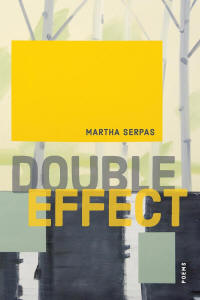
~ Delta Poetry Review ~
Martha Serpas's Book Reviews by Stephen Furlong
 |
 |
The Diener: Poems. Louisiana State University
Press 2015. 80
pp. $17.95
|
Double Effect: Poems. Louisiana State University Press 2020. 73 pp. $17.95 |
As an instructor of first-year composition I
often teeter between my undergraduate lineage of creative writing
and the focus of composition and rhetoric from my graduate school
years, and as such, one of my go-to essays is “On Keeping a
Notebook” by the late Joan Didion. The weaving of the memories and
the reflecting on the memories is something I try to impart to my
students—especially when I am face-to-face with a student possessing
convinced resignation: “I’ve got nothing to write about.”
Enter Joan Didion: “Remember
what it was to be me: that is always the point,” she
writes early on in the essay. An early lesson from my first creative
writing class was that, at some level, a writer is writing for the
sake of the writer. Sure, there is a hope someone else will find our
words and say “Ah yes, that’s something I felt too. Thank you for
putting it into language for me.” But, before others discover our
work, it is important to recognize how the work can help us discover
ourselves. That self-discovery, or perhaps self-uncovering, is
resonant in Martha Serpas’s books
The Diener
and Double Effect.
Roughly in the middle of
The Diener, I found myself held by the ending of her
poem “Travel Slowly Back.” The poem closes:
“Life is a circle, turning sometimes
right,
sometimes left,” he said. “Don’t
forget
grief has no center, only an apex.
Travel slowly back.”
The line breaks here
allow for a pause and afford the words to sink in just a bit more,
which is a testament to the poetic landscape Serpas is able to
create. Allowing the reader a bit more insight into the “he” of this
poem, Serpas writes the following: “I could see through the synapses
of / every face behind him / the way one can see / the bottoms of
pools, / the stainless stars.”
This is followed by a beautifully
devastating line—“I know you don’t believe it, but this is all about
you.” This poem breaks open the collection and, for me, the reading
of Serpas’s work, because it reveals her land, her faith in
communication, as well as in communion with others. As blurb writer
Sandra Alcosser posits “Again and again the speaker of this tidal
sequence dives under the surface into reef and wreck, submerging the
self, not to bring back answers but to prolong and enforce
unknowingness.”
Whoa. Quite right. Quite right indeed.
An earlier poem in the book, “Crossing,” also
speaks to the dive forementioned by Alcosser. Right from the
beginning, Serpas sets the scene:
Out on the open water, finally, they
see all
seven deltas and their depositions,
mouth bars and inlets
running like childhood scars across
the coast.
Once again, Serpas commands strength in a line
break in the first line, and then the imagery blurs together “like
childhood scars across the coast,” which serves as one of my
favorite lines from the book. The scene continues with shrimping
“till the nets are empty.” Then, near the middle of the poem, Serpas
works her magic again:
…a certain sweat while they scan
for the new order of things,
which is the old order renewed, things
moving swiftly but weighted immovable
in their eyes. Someone might forget
to declare “good” or “very good” or “evil”
as they drift among their last
breaths, their burials,
and this third idle death that frees
the soul’s
wisdom, still ignorant of its
crossing.
Serpas’ poetic power here is in full display by
revealing to the readers the duality of crossing through a seascape
to the crossing between life and death—both existing in the same
poem because both exist in the same life. It’s through this poetic
move that the speaker of Serpas’s poems invites us into their line
of vision time and time again. I also admire the quote marks around
“good,” “very good,” and “evil” because of the way they represent
constructs we create around our lives, our deaths. The poem takes a
turn, a question I’ve since scribbled on a Post-it note that sits
inside a journal: “Who knows what God will breathe out / after our
last breath is drawn?”
Another memorable, powerful moment in Serpas’s
work.
The fusion of lyrical and inquisitive language reminds me of the
enduring quality of “and” in Serpas’s work—how layers exist and what
those layers are. This is thoughtfully expressed by Serpas in an
interview she did with
Flogged Clarity. She reflects:
…if
a poem is not grappling with paradox then I tend to be frustrated
with it, and sometimes the paradox is expressed through a contrast
between the music and the semantic meaning of the poem. I’m
frustrated with poems that choose one mode or the other, and I do
think that that trying to reconcile differences, even as one knows
they can’t be reconciled, is what poetry does.
I admire the sincerity of these words; the comment on reconciliation
in poetry is fascinating to me because of my own upbringing—raised
Roman Catholic, only to become a roamin’ Catholic—and also speaks to
the way Serpas’s cross-section of faith and poetry exist.
Double Effect—an
idea and way of living coming from St. Thomas Aquinas—further
explores Martha Serpas’s cross-section of faith and poetry and, as
the book blurb states, “finds joy in survival, in love, and in
spiritual fulfillment.” Serpas speaks to the title in a fascinating
interview with Nadia Colburn:
I took a palliative course in my studies as a chaplain, and boy, my ears perked up when someone was presenting on what's called Last Morphine Dose, the ethical conundrum of wanting to relieve a dying patient of pain and yet knowing that that dose of morphine is going to bring on death more quickly. And I learned that it was the writing of Aquinas which we still base that ethic on, and that he wrote a doctrine of “double effect”: basically a series of questions one has to ask oneself when trying to make a moral decision. (Text bolded, as per Colburn’s author site)
That Last Morphine Dose
philosophy engages me in deep thought for which I don’t have
language right now, but as I refer to later, appears in a memorable
poem from
Double Effect.
An
early poem in the book, titled “Preface,” ends with a line from
Chita: A Memory of
Last Island by Lafcadio Hearn, which reads “Anyone
wanting to die must go elsewhere.”
On a tangible level, it’s true—when the dead go, they do have
to go to a different place, i.e. not
here. But it also
speaks to the desire of moving to that place. This duality of
movement is present time and time again in
Double Effect
and, in many ways, this allusion speaks to the theme of the text.
This happens across the multiple sections of the text —four of which
are named the following:
Good, Bad, or Indifferent, Voluntary, The Means,
and
Compensation.
Each section moves the reader along, through the marshy
landscape, but also through spiritual growth and stagnation, mental
strife, among other landscapes.
Another poem, “Double Effect: St. Joseph’s Altar, March 19,” is one
of the two “Double Effects” titled poems found. Roughly halfway
through the poem, Serpas asks a poignant, enduring question: “Is
this the
hubris, / not to give constant thanks?” I am once again faced with
the image of convinced resignation I alluded to earlier, but the
poem pushes further still to show that resignation, mixed with
skepticism that oft follows those who hold onto faith. The poem
reads:
Any evil here couldn’t be like
taking a life to save your own
or giving that last dose of morphine
that you know will salve the pain
but shut the door.
Surely it’s a great good
to remember a miracle?
The line you know will
salve the pain / but shut the door has stayed with me
consistently in my reading and re-reading of Serpas’s work, and to
follow that with the dagger of a question. I’m awed by the
persistence that is found in this poem and in Serpas’s work at
large. I don’t want to spoil the poem entirely, but I offer that the
persistence continues in creative and critical disposition.
As
I turn to close my thoughts, I hold onto a poem titled “Local Gods”.
The poem is an imagining of a Cajun god “nursing the same / Jack and
water, ready to talk—who’s
ya daddy / che’?” Che’, as defined in the
glossary in the back of the book, means “dear”; the poem, the god,
are tender and inviting. The poem serves as a collision of the
spiritual and the landscape, which is a testament to Martha Serpas’s
work. Each exploration a different avenue, each avenue a different
way of seeing the world—truly memorable and thoughtful work from a
truly memorable and thoughtful poet.
Martha Serpas's Poetry and Bio
| Archive | Submissions | About | News |